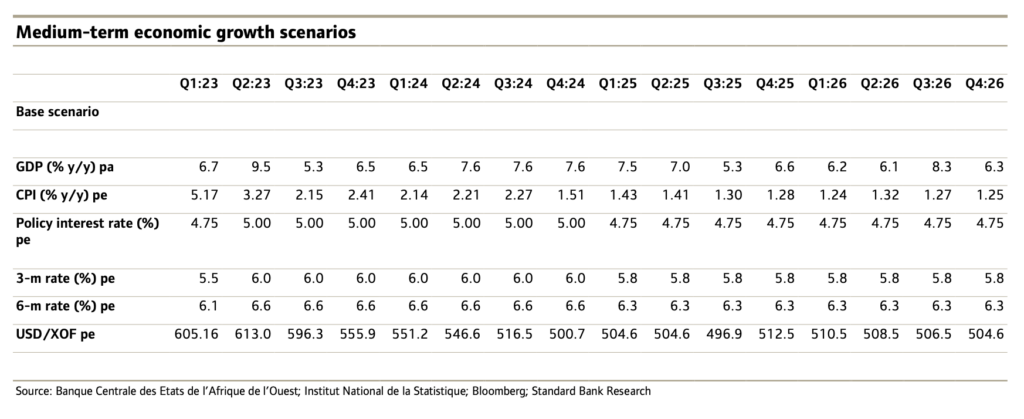Côte d’Ivoire: IMF deal should support 2021-2025 NDP
Medium-term outlook: broad-based growth
We retain our 2023 GDP growth forecast at 7.0% y/y, and 7.4% y/y for 2024.
2022 GDP growth of 6.8% y/y broadly matched our 6.9% y/y estimate in the AMR Jan edition. Though growth was broad- based, the secondary industries boosted economic activity by posting growth of 10.2% y/y, in particular the construction sub-sector (which was up 27.7% y/y, from an average of 9.8% from 2017 to 2021). This reflects ongoing major infrastructure projects and the rehabilitation of the coastal linkages between San Pédro and Abidjan. The services sector too grew meaningfully (8.9% y/y) due to robust activity in hotels and restaurants, as we had anticipated, though the primary sector managed merely 1.9% y/y growth.
The construction sector should recover further this year. For Q1:23, the construction leading indicator was up 22.1% y/y on average. Moreover, the African Cup of Nations (AFCON), to be hosted in Côte d’Ivoire in 2024, will boost construction as well as the tourism sector and related ancillary sectors.
In addition, the USD3.5bn 40-m IMF ECF/EFF programmes, approved in May 23, releasing an immediate disbursement of USD495.4m, should assist macroeconomic stability, complemented by pro-growth reforms under the government’s 2021-2025 National Development Plan (NDP).
The floating production storage and offloading (FPSO) system is en route for deployment at the Baleine oilfields, the largest hydrocarbon discovery in Côte d’Ivoire; this vessel should increase oil production. First-oil production from this oilfield, by Eni, is expected in H2:23. Production is estimated at 12,000 bbl/d of crude oil and 17.5m cubic feet/d of natural gas. Prospects of full-field development may transpire by 2026 and could produce 75,000 bbl/d -100,000 bbl/d of crude oil and 140m cubic feet/d of natural gas.
The agrarian sector however faces unfavourable weather conditions. The ongoing above-average rains in most cocoa- growing regions may damage the Apr-Sep crops and diminish cocoa bean quality. In addition, the measures, implemented to cap cocoa-bean production at two million tonnes to prevent further deforestation, is also a factor. Notwithstanding, plans are underway to increase domestic cocoa-grinding capacity by a further 120,000 tonnes when new processing plants are commissioned in Q4:23.
Poor capacity in the domestic electricity sector still presents a risk to industry and the broader economy. That said, the authorities have signed an agreement with a company based in the UAE to explore the development of a 50-70MW solar plant.













